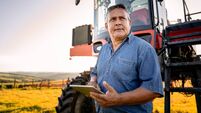Your legal responsibilities for the safety of your farm workers

A risk assessment and safety statement should be carried out in respect of the farm. These should identify any farm hazards which may cause death, serious injury or ill health. Picture: iStock
Dear Liam
The Health, Safety and Welfare of Work Act of 2005 imposed a legal obligation on every person in control of a workplace to identify potential hazards and to ensure the health and safety of their employees in their place of work.
Under this act, farmers are required to prepare and implement a safety statement. However, farmers with three or fewer employers may instead follow the code of practice. This is the code of practice for preventing injury and occupational ill health in agriculture.
This is a very important guide and all farmers are recommended to read it and follow the practices contained within the document. The code of practice sets out a number of steps which should be taken which include the following:
- Prevention or control measures need to be carried out. It is advisable to try and eliminate hazards completely or if this is not possible you should endeavour to reduce the danger as much as possible;
- A risk assessment and safety statement should be carried out in respect of the farm. These should identify any farm hazards which may cause death, serious injury or ill health. It would be advisable to walk around your farm and examine all aspects of it from a health and safety point of view. You should consider all work activities, the workplace and work systems that are in place when carrying out this assessment;
- Appropriate training and supervision in respect of all activities on the farm should be carried out;
- Personal protective equipment and clothing should be provided to employees.
- The safety statement and risk assessment need to be updated regularly and should be revised annually. Under the legislation, the following factors should be considered:
- That there is a safe place of work in place;
- That all employees on the farm are using safe work equipment which is suitable for its purpose and is safe having regard to health and safety regulations. One should also ensure that they are using suitable equipment for the task at hand;
- All employees should be properly trained as well in respect of tasks that they are carrying out and should have the requisite information and skills to secure health and safety.
- Accidents need to be reported to the health and safety authority under certain circumstances including where there is a dangerous occurrence or where a death of a worker occurs.
- Employees need to be informed of matters relating to health and safety including identifying any hazards, preventative measures that are in place concerning health and safety and the name of a person or safety representative who can be contacted in an emergency situation.
It is important that you continue to identify hazards and take preventative measures. These are proven ways of reducing the risk of farm accidents. It is in your best interest to set out a clear Safety Procedure Statement and enact regular safety checks and provide adequate training to employees. In the event that you have been involved in an accident that may have legal implications, it is advisable that you take the advice of a solicitor.
Email: info@walshandpartners.ie - Web: www.walshandpartners.ie
- While every care is taken to ensure accuracy of information contained in this article, solicitor Stephen Coppinger does not accept responsibility for errors or omissions howsoever arising, and you should seek legal advice in relation to your particular circumstances at the earliest possible time.











